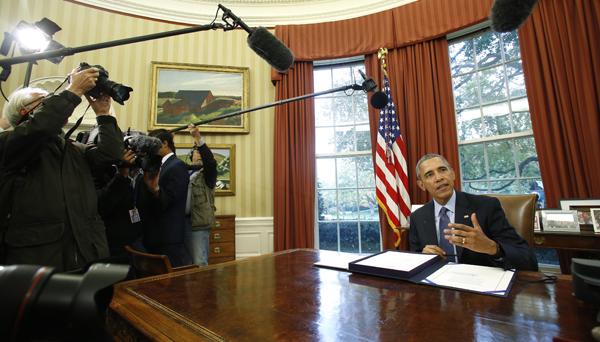You are here
Obama signs 2-year budget, debt deal before default deadline
By Agencies - Nov 02,2015 - Last updated at Nov 02,2015

US President Barack Obama talks to the media before signing the Bipartisan Budget Act of 2015 in the Oval Office of the White House in Washington, DC, on Monday (AFP photo)
WASHINGTON — President Barack Obama on Monday signed into law a bipartisan budget bill that avoids a catastrophic US default and puts off the next round of fighting over federal spending and debt until after next year's presidential and congressional elections in November.
Obama praised the rare bipartisan cooperation behind the deal, saying that two-year agreement puts the government on a responsible path.
"It should finally free us from the cycle of shutdown threats and last-minute fixes and allows us to, therefore, plan for the future," Obama said in brief remarks as he signed the bill.
Tuesday was the deadline for averting a default on US financial obligations by raising the debt limit.
The Senate gave final approval to the House-passed bill late last week and sent it to Obama. He signed it in the Oval Office, shortly before departing on a day trip to New Jersey and New York.
The legislation raises the limit on the government's debt through March 2017, pushing reconsideration of what in recent years has become a contentious issue until after the elections for the White House and Congress in November 2016.
The measure also sets federal spending through the 2016 and 2017 fiscal years, and eases strict caps on spending by providing an additional $80 billion, split evenly between military and domestic programmes.
The appropriations committees must write legislation to reflect the spending and they face a December 11 deadline to finish the work.
Negotiations over the budget, which began weeks ago, wrapped up quickly last week as Republican Representatve Paul Ryan prepared to become the new House speaker.
Obama negotiated the agreement with Republican and Democratic congressional leaders who were intent on steering the institution away from brinkmanship and government shutdown threats that have haunted lawmakers for years.
Republican Representatve John Boehner of Ohio, who stepped down both as speaker and from his seat in Congress at the end of last week, said he felt a sense of urgency to reach a deal before turning the gavel over to Ryan.
Other lawmakers wanted the issue taken off the table as they look ahead to next fall's elections.
Obama called the deal "a signal of how Washington should work" and urged lawmakers to keep up the collaboration.
"My hope is now that they build on this agreement with spending bills that also invest in America's priorities — without getting sidetracked by a whole bunch of ideological issues that have nothing to do with the budget," he said.
The $80 billion in additional spending is paid for with a mix of spending cuts and revenue increases touching areas from tax compliance to spectrum auctions.
The deal would also avert a looming shortfall in the Social Security disability trust fund that threatened to slash benefits, and head off an unprecedented increase in Medicare premiums for outpatient care for about 15 million beneficiaries.
The plan will lift caps on the appropriated spending passed by Congress each year by $50 billion in 2016 and $30 billion in 2017, evenly divided between defense and domestic programmes. Another approximate $16 billion would come each year in the form of inflated war spending, evenly split between the defence and state departments.
Separately, the Congressional Budget Office (CBO) said last month that the US budget deal would reduce deficits by nearly $80 billion over 10 years due to increases in revenues and lower expenditures on healthcare, pension guarantees and Social Security.
The legislation, which would ease automatic spending caps to increase discretionary spending by $80 billion over the next two fiscal years, would produce larger savings in later years, according to the analysis by the CBO, Congress' nonpartisan referee agency on fiscal matters.
The budget plan would show a net deficit increase of $4.6 billion in fiscal 2016 and $53 million in fiscal 2017. But this swings to annual deficit reductions of $4.9 billion to $9 billion between fiscal 2018 and fiscal 2025.
The deal would add $32.3 billion in revenues over the 10-year period, chiefly from tax compliance, health care and pension provisions, while reducing estimated outlays by $47.6 billion.
Related Articles
WASHINGTON — US President Barack Obama early Friday won congressional passage of legislation that lifted the threat of a default on governme
The United States on Wednesday renewed a warning that Europe risks falling into a downward spiral of falling wages and prices, saying recent actions by the European Central Bank (ECB) may not be enough to ward off deflation.
WASHINGTON — At their national convention in 2012, Republicans mounted a clock counting the growing US national debt on the wall, a warning
















